| |
| |
Part 1: For the young ones:
Two-stroke |
|
|
|
|
| |
|
|
| |
|
KDX50 |
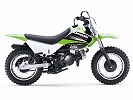 |
 |
|
Power, weight & seat height |
|
-hp, 84 LBS, 18.9 in |
|
The KDX50 is an
entry-level machine for youth who are discovering the joys of off-road
recreation. The KDX50 is equipped with a host of features designed to
help kids learn the fundamentals of motorcycle riding, including a
single-speed transmission with automatic clutch. Adult supervision is
made easy with an adjustable power limiter that allows parents to
control their child’s speed and progress.
KAWASAKI KDX50 Features
and Benefits
• Air-cooled, two-stroke
engine features automatic oil injection, eliminating the need to premix
gasoline
• Built-in throttle limiter and removable power reduction plate in the
exhaust helps adults regulate speed
• Single-speed transmission and automatic clutch inspires confidence in
young riders
• Digital CDI ignition provides easy, no-hassle kick starting and
requires no maintenance
• Height-adjustable suspension allows seat height to be raised so bike
can grow with the rider
• Telescopic front forks and twin rear shocks provide comfortable ride
• Front and rear mechanical drum brakes give ample stopping power
• U.S Forest Service-approved spark arrestor comes standard
• Plastic fuel tank, fenders, number plates and foot pegs are inspired
by Kawasaki’s KX motocross bikes
• 6-month warranty, with optional Kawasaki Good Times Protection Plan |
|
| |
|
| |
|
| |
Modifications for 2004: |
|
|
| |
|
|
| |
|
KX60
KX60-B20 |
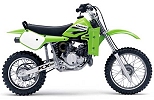 |
 |
|
Power, weight & seat height |
|
15hp, 50.5 kg, 710 mm |
|
Next step, a good
start for the youngster wanting to start in motocross. The Kawasaki KX60
is the smallest true motocross bike
Kawasaki build and
just the right size for a future champion to learn to ride on.
KAWASAKI KX60 Features
and Benefits
-
A
strong rider friendly power plant, liquid-cooled just like the
professionals use.
-
An
engine producing good power and torque at all rpm.
-
6-Speed Transmission
-
High
Tensile Steel Frame
-
Uni-Trak Rear Suspension
-
Nitrogen-Charged Shock
-
Works-Type Seat, makes it easy to shift your weight forward for more
front wheel bite in the turns.
|
|
| |
|
| |
|
| |
Modifications for 2004: |
|
|
| |
|
|
| |
|
KX65 |
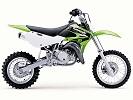 |
 |
|
Power, weight & seat height |
|
16.7hp, 57 kg, 760 mm |
|
The Kawasaki KX65 is the
smallest KX and is built for experienced young racers as well as
youngsters who want to improve their riding skills before advancing to a
larger-displacement model. A liquid-cooled, high-performance two-stroke
engine powers the KX65 and features a strong, lightweight piston
residing in an Electro fusion-coated cylinder.
The KX65 has a quick and
smooth-shifting six-speed transmission with a manual clutch-actuating
mechanism. The KX65 engine rests in a semi-double-cradle steel
frame with reinforced tubing on the upper-main and rear-down tubes. And
like its larger-displacement siblings, the KX65’s swing arm uses the
bottom-link UNI-TRAK® system, which applies progressively stiffer
damping and spring rates to the single rear shock as the suspension is
compressed. The shock and fork boast four-way adjustable rebound damping
for optimal handling. Lightweight aluminium rims reduce unsprung
weight to help improve suspension action. Both wheels feature hydraulic
disc brakes that not only provide great stopping power, but require
little maintenance and simplify wheel removal. The slim tank, seat
and side covers contribute to the KX65 motorcycle’s sleek, racy
appearance and enhance rider manoeuvrability. It also sports the
unmistakable Kawasaki Lime Green plastic and graphics as the larger KX
motorcycles. |
|
| |
|
| |
|
| |
Modifications for 2004: |
New graphics to make it
look more like the KX85 |
|
| |
|
|
| |
|
Many of the
world's top riders got their start riding Kawasaki KX80 Junior Motocross
machines. The KX80's were incredibly successful winning Junior
championships all over the world. The KX85 replaced the KX80 (in 2001)
and is more powerful and even more competitive than the 80. So if your
aim is to be a future champion Kawasaki's KX85 is the bike for you.
There are two models, KX85 and KX85-II, the difference are the wheels
the KX85 have 17in front and 14 in. rear wheel, the KX85-II (also called
Big wheel) have 19 in. front and 16 in. rear wheel. When you outgrow the
normal Junior motocross bikes but you are not yet ready for a 125,
Kawasaki has the solution. Go for the KX85-II, bigger diameter wheels
mean a higher seat and more ground clearance and an easier bike to
handle when the standard size bikes have become too small.
The KX85 provides plenty
of power, thanks to its liquid-cooled, two-stroke, single-cylinder 84cc
engine. It’s equipped with high-tech features, such as an Electro
fusion-coated cylinder with a narrow squish band and large volume to
enhance top-end power. Fuel delivery for the engine is provided by a
28mm carburettor that features a crescent-slide to position the needle
closer to the intake ports. A Kawasaki Integrated Power-valve System
(KIPS®) and exhaust pipe capped with a KX250-style muffler complement
the KX85.s tractable power band, which is easy to control for riders of
varying skill levels. A smooth-shifting six-speed transmission. The KX85
utilizes a high-tensile steel perimeter frame, and a specially designed
gas tank sits inside the frame, lowering the fuel load and center of
gravity for improved handling, yet another design borrowed from the
bigger KX motorcycles. Long-travel suspension features a 36mm inverted
cartridge front fork that has the capability of 18-way compression
damping adjustment. Out back, the spring preload, compression and
rebound damping are all adjustable on the UNI-TRAK rear suspension
system.
 |
Read an article about the KX85, click the picture at
left. |
|
|
| |
|
| |
|
| |
Modifications for 2004: |
Minor
modifications of the KIPS exhaust port, new graphics. |
|
| |
|
|
| |
|
KX100
KX100-D3 |
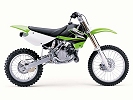 |
 |
|
29.2hp, 68kg, 870mm |
|
The
Kawasaki KX100 is built for the young motocross racer transitioning from
a minicycle to the full-sized bikes. Based on the smaller KX85 chassis
(big wheel version), the rider is quickly familiar with the larger
KX100, which benefits from an increase in engine displacement, larger
wheels and tires, and suspension with longer travel.
Main differences over the KX85-II is a bigger engine at 99ccm
displacement. The motor breathes through a 28mm carburettor with a
crescent slide to position the needle closer to the intake ports.
A large air intake cutout on the airbox and large-diameter duct to the
carburettor improve airflow. Meanwhile, a carbon-fibre intake reed valve
aids throttle response and a smooth-shifting six-speed transmission gets
the KX100 around the track. In the braking department, both front and
rear discs are mounted with shoulder bolts for easier maintenance.
In short a stronger KX85-II |
|
| |
|
| |
|
| |
Modifications for 2004: |
New graphics |
|
| |
|
|
| |
For the young ones:
Four-stroke |
|
| |
|
|
| |
|
KLX110
KLX110-A3 |
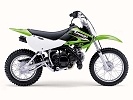 |
 |
|
Power, weight & seat height |
|
6.2hp, 64kg, 650mm |
|
Maybe the best way
to introduce a child to the fun of off-road riding, get the
kid on a KLX 110, the 4-stroke mini that's specially designed for
young, first-time riders. Loaded with easy-to-ride features and
featuring attractive KX styling, the Although this little Stroker
features racy styling and bodywork similar to the KX mini-crossers, the
KLX 110 is not a race bike, it is a play bike, and might best be
described as a mini-enduro.
The
KLX110 is powered by an 111cc air-cooled, two-valve, four-stroke engine.
This motor is the epitome of user-friendly and is even equipped with a
screw-type throttle limiter mounted on the handlebar housing. This
easily accessible feature means parents can control the power output
with a simple turn of a screw. The engine’s tractable power is
delivered to the rear knobby via an easy-shifting, semi-automatic
three-speed transmission, complete with centrifugal clutch. Newer riders
gain confidence quickly by focusing on steering and balance instead of
clutch coordination. The compact fuel tank, saddle, sporty
shrouds, side covers, and number plate were all plucked from Kawasaki’s
smallest competition motocross machine, the popular KX65.
And
while it’s primarily designed for trail riding, the KLX110 has become a
favourite with adult riders who are modifying the KLX110 for competition
at mini-motocross events held in backyards and arenas nationwide.
|
|
| |
|
| |
|
| |
Modifications for 2004: |
New graphics |
|
| |
|
|
| |
|
The
Kawasaki KLX125 off-road motorcycle and it’s big-wheeled sibling, the
KLX125L, are specially built for youth riders ready to move up from
smaller bikes. They’re also perfect for novice adult riders who like the
confidence-inspiring low seat height.
These easy-to-start off-road motorcycles, with their user-friendly
four-stroke engines, share the same chassis and components but differ in
wheel sizes and brakes.
While the KLX125 sits on
a 17-inch front wheel and 14-inch rear wheel, the taller KLX125L rests
upon 19-inch front and 16-inch rear wheels. Plus, the KLX125 is fitted
with drum brakes at both ends, while the KLX125L features a front disc
brake and rear drum brake.
Powered by a torque and responsive air-cooled 125cc four-stroke single,
both the KLX125 and KLX125L pump out plenty of rider-friendly power for
off-road fun. The engine has been specially tuned for ample low and
mid-range power and a smooth shifting five-speed transmission means
there’s a gear for every riding situation. A cable-operated manual
clutch, along with a digital CD ignition for quick starts, makes this
quiet-running motorcycle reliable and easy to operate.
A
high-tensile steel frame with a rigid carbon-steel swingarm add to the
machines. durability and lightweight handling characteristics, while
bumps are soaked up by a long-travel front fork and linkage-equipped
single-shock rear suspension system. The combination of a short
wheelbase and a very comfortable riding position make both the KLX125
and KLX125L fun to ride on a variety of terrain. Inspired by Kawasaki’s
KX models, the fuel tank, slim seat and number plates give the bike an
exciting look, while the classic lime green plastic gives it a true
Kawasaki identity. |
|
| |
|
| |
|
| |
Modifications for 2004: |
|
|
| |
|
|
| |
|
|
| |
| |
Kawasaki model
information in PDF Format. |
|
| |
 |
|
 |
|
 |
|
 |
|
 |
|
| |
KX60 |
|
KX65 |
|
KX85-100 |
|
KLX110 |
|
KLX125 |
|
|
|
| |
|
|
|
|
|
|
|
|
|
| |
| KDX50 |
 |
| |
|
|
| |
|
| |
|
| |
|
|
| |
| KX60 |
 |
| |
|
|
| |
|
| |
|
| |
|
|
| |
| KX65 |
 |
| |
|
|
| |
|
| |
|
| |
|
|
| |
| KX65 |
 |
| Big
picture |
|
|
| |
|
|
| |
| KX65 |
 |
|
Engine details |
|
|
| |
|
|
| |
| KX85 |
 |
| |
|
|
| |
|
|
| |
| KX85 |
 |
|
Engine details |
|
|
| |
|
|
| |
| KX85 |
 |
|
Engine details |
|
|
| |
|
|
| |
| KX85-II |
 |
| Big
picture |
|
|
| |
|
|
| |
| KX100 |
 |
| |
|
|
| |
|
|
| |
| KLX110 |
 |
| Big
picture |
|
|
| |
|
|
| |
| KLX110 |
 |
| |
|
|
| |
|
|
| |
| KX125 |
 |
| |
|
|
| |
|
|
| |
| KX125L |
 |
| |
|
|
| |
|
|
| |
| KX65-100 |
 |
| |
|
|
|

